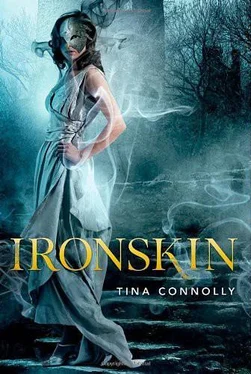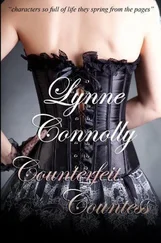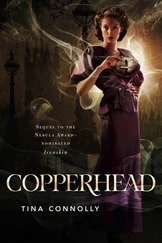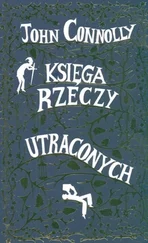“A letter?”
Bright eyes gleamed, but the butler didn’t answer the obvious. As Poule reached up to hand Jane the letter, Jane saw a stray flash of light from her sleeve, as if light glanced off metal. Jane’s eyes narrowed. Just what kind of roles were Mr. Rochart’s servants really playing? The woman turned and left, her worn black shoes stirring up a small puff of flour that Dorie had spilled.
Jane slit the envelope with a silver paring knife and tugged out a thick fold of heavily written-on paper. “It’s from Helen!” she said. “I was almost getting worried. I’ve written her twice.”
“And she not once?” said Cook. “Tsk.”
Jane laughed and dismissed the implied rebuke. “Helen probably has twenty letters started to me by now—seventeen of them mislaid. Goodness knows what the flat looks like anymore.” She unfolded the page, pleased that Helen had managed to get a letter actually out the door to her. “Dearest Jane…” began the letter, and then, typically Helen, it launched into a flowery description of the latest ball she and her fiancé had attended, replete with tidbits of gossip about people Jane had never met. The flow of minutiae was occasionally interspersed with a command for Jane to return to the city immediately and have as delightful a time as Helen was having.
Jane flipped over the page, and an engraved card fell out and fluttered to the floor. Jane picked it up—and stopped.
“It’s a wedding invitation,” she said.
“As should be,” said Cook. “You said she was betrothed.”
“Yes, but I thought she was waiting till the summer,” said Jane. “When the family left on their summer travels.” A familiar worry tugged at her inside—that Helen was busy making rash decisions without Jane there to advise. Not that Helen always listened. Jane was not entirely certain about the character of Helen’s fiancé, but when she had dared mention any concerns, Helen had stormed about, insisting that she adored him, that any faults were easily mendable, and what did Jane know about marriage anyway.
“Soonest’s best,” said Cook. “Otherwise the man might be finding a new lass, or the woman getting in a spot of trouble.” She beat the batter hard, her wooden spoon hitting the side of the bowl with muffled thumps.
“Helen would not,” Jane said positively. “She is not, I’m sure of it. Likely she’s lonely without me, and dying for something new to happen. Neither of us were born with much patience.” Jane flipped the engraved card around in her fingers, the attendant letter almost forgotten. “The wedding is soon—just after her eighteenth. Do you think he’ll grant me leave?”
“Only way of finding out is asking,” said Cook.
Jane looked up at the older woman, startled. “Am I allowed to go up there? To his studio?”
Cook tapped the cake tin full of batter against the counter, leveling it with sharp thwacks. “He’ll not be having any appointments today, so I expect you’d be safe. Mind you, you’re not to be saying I said so. And knock first.”
“All right,” said Jane. She stood up, brushing her dark skirts clear of flour and crumbs. “I’ll go.” She glanced down at Dorie, now lying on her back and pointing her toes at the ceiling for no discernible reason.
“Sure and I’ll watch her,” said Cook. “This is her I’ll-be-an-angel-if-no-one-is-crossing-me stage. I know it well.”
Jane nodded, folded the unread letter in her pocket, and took a breath. “I’ll go,” she said again. “It’s just a studio.”
Just a man.
* * *
She repeated that to herself as she climbed the stairs outside the kitchen. Where they opened on the first floor she stopped and peeked out, calculating that this should be the damaged wing she had studied from the back lawn. The hall was nearly pitch black, and she couldn’t see if there was damage or not. At the far right a thin slit of light implied a break in the forest-green curtains she had seen in the foyer.
Jane continued climbing.
She wondered as she went past the floors if she was supposed to know immediately where Mr. Rochart worked. Would it be obvious? Or was it off one of the black landings, branching off one of the dark and destroyed rooms?
But at the fourth floor the stairs stopped and it was obvious. The landing was lit with the most light she’d seen yet in the house. This was the top floor, and the roof was sloped overhead, the great beams visible. It looked like it should be the garret, she thought. It shouldn’t be where the master worked—it should be servants’ quarters, dark and cloistered cubicles of space, twisting corridors.
But perhaps those walls had been removed, knocked out. Perhaps this area had been transformed.
On one side of the landing was a large empty area, bright and filled with light. Its polished wood floors were brighter than anything in the house.
On the other side was a long white wall with one door. The door was ajar, and Jane could just see a form moving around inside.
She walked over and knocked. “Mr. Rochart?”
“Come in.”
She pushed open the door and entered. She had seen shadows moving, heard him—but now, where was he? The room was empty.
Jane turned slowly, looking around the broad rectangular space. The long side opposite was a wall of windows that should face the backyard and the woods, if she hadn’t gotten completely turned around. On one end of the room was a second door, and on the other was shelving filled with supplies—some of which Jane recognized as pens and charcoal and pastels, some of which were unknown to her. A heavy worktable sat in the middle of the room, covered with tools and more stacks of materials. The walls in the wide room were white, and all the remaining available surfaces were lined with more of those same skin-colored masks that encircled the red waiting room off the foyer. It was strange that anything with hollow eyes could seem so much to leer.
A noise from behind, and she startled. “Sir?”
Quiet. Then Mr. Rochart emerged from that other door in the north wall, pulling it closed behind him. “Miss Eliot,” he said, formally polite. Perhaps he was remembering that he had not come to speak with her as he had promised. “Did Poule send you up here?”
“She brought me a letter,” said Jane, temporizing in case she would get the cook in trouble for pointing her the way. “I hope I’m not intruding.”
“Of course not. I see you are studying the masks.”
“They’re hideous,” Jane said bluntly. Too blunt, but it was the second time that he had caught her looking at them, and she was annoyed by their intentional ugliness. As if he knew that people would stop and stare at deformity, as if he were taking what she had to deal with every day and warping it for his own amusement. “I gather they’re supposed to be.” The masks caught and held the eye with their perversity—rows and rows of protruding teeth, cruel scowls, cauliflower ears.
“They’re the worst in people,” Mr. Rochart said. “Extracted and displayed. A reminder.”
She could not decide how old her new employer was. When his eyes were shadowed from her, hidden, then he seemed relatively young—late twenties perhaps. But sometimes she saw those deep amber eyes, and then he seemed a hundred years old. It was a strange feeling. “I don’t understand why you need a reminder of how evil people can be,” she said. “It’s something I try to forget.”
He moved closer, the formality fizzling off and away, as if by coming to the studio Jane had given him the necessary permission to indulge in speaking with her, watching her. His lean frame was so near to her own. “Sometimes we have to remind ourselves what we are capable of.” There was a well of sorrow in those amber eyes, and Jane didn’t know what to say. Her heart beat fast, without her permission. “I wonder what we all would be like, without the Great War. You would not be here to rescue me, Jane, so what life would you lead…?”
Читать дальше












